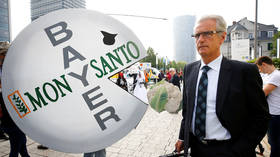French & German farmers forced to destroy crops after GMOs found in Bayer/Monsanto seeds
Published time: 7 Feb, 2019 02:26Edited time: 7 Feb, 2019 02:51

French and German farmers have been forced to dig up thousands of hectares of rapeseed fields after authorities found an illegal GMO strain mixed in with the natural seeds they’d bought from Bayer-Monsanto.
Authorities discovered the illicit seeds in three separate batches of rapeseed seeds last fall, but the public has only just been notified. While Bayer issued a recall, by the time the farmers learned of it some of the seeds had already been planted, covering 8,000 ha in France and 3,000 ha in Germany.
Bayer-Monsanto estimated the number of rogue seeds at just about .005 percent of the total volume of rapeseed seeds sold to both nations under the brand name Dekalb, but each country has a ban on GMO cultivation, with strict penalties for “accidental” contamination of standard crops.
ALSO ON RT.COM‘Completely safe’: Monsanto owner Bayer hit by new wave of lawsuits over Roundup weed killer
The agrochemical giant refused to estimate the total cost of the GMO contamination, which knocks out not only this season’s crop but also the next season’s, as farmers will be barred from growing rapeseed next year “to avoid re-emergence of the GMO strain,” according to Bayer-Monsanto’s French COO Catherine Lamboley. They offered to compensate farmers €2,000 per hectare, which would work out to about €20 million between both countries.
The cause of the contamination is unknown, Lamboley said, claiming the seeds were produced in Argentina “in a GMO-free area” and declaring that the company “has decided to immediately stop all rapeseed production in Argentina.” The rogue GMO seeds were of a variety grown in Canada that is banned in Europe, although imported food made with the modified rapeseed is permitted for human and animal consumption as long as it is adequately labeled.
Bayer acquired Monsanto for $63 billion last year at a low point in the reputation of the chemical company. The company found itself in the legal spotlight again this week, as French farmer Paul François, who has been fighting Monsanto in court for 12 years, faced his last appeal after a court overturned two previous rulings in his favor. François alleges Monsanto’s Lasso weedkiller caused his disabilities, which include amnesia, vertigo, seizures, irritability and even recurring comas. American groundskeeper Dewayne Johnson, who claimed Monsanto’s glyphosate weed killer Roundup caused his cancer, won $78 million in a history-making verdict last year that has opened the door to over 9,000 other lawsuits pending against the company. France banned Lasso in 2007, and last month a French court canceled authorization to market Roundup, citing health concerns. While glyphosate is legal in France, its use is strictly regulated and President Emmanuel Macron has pledged to outlaw it by 2021.
ALSO ON RT.COMEU approval of glyphosate weed killer was based on ‘plagiarized’ Monsanto studies, report finds
In January, it emerged that Germany’s Federal Institute for Risk Assessment had plagiarized entire chapters from Monsanto company literature in a “safety assessment” aimed at proving to EU regulators that the controversial pesticide was safe as it came up for relicensing in 2017. While the relicensing passed, individual European countries have increasingly come out against the chemical.

0 Comments:
Post a Comment
Subscribe to Post Comments [Atom]
<< Home